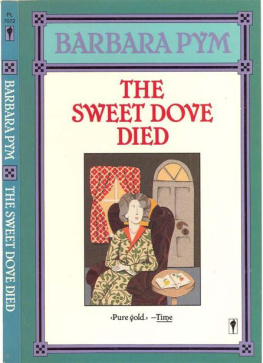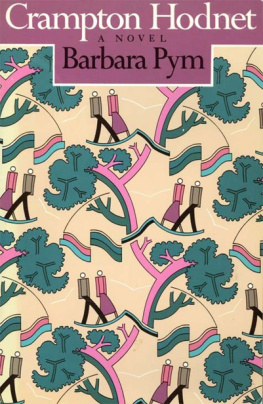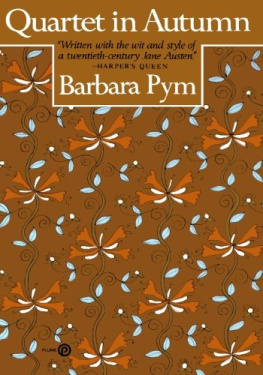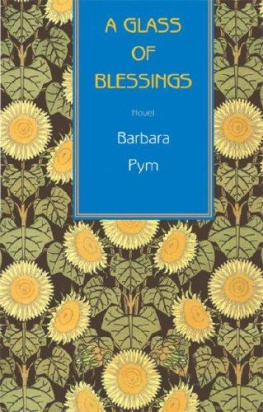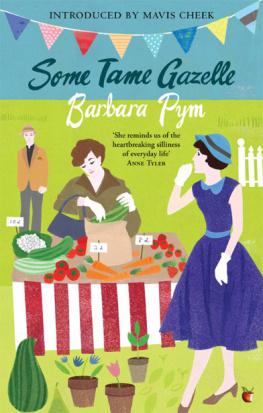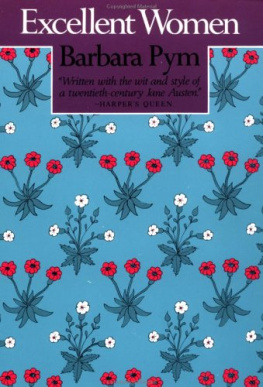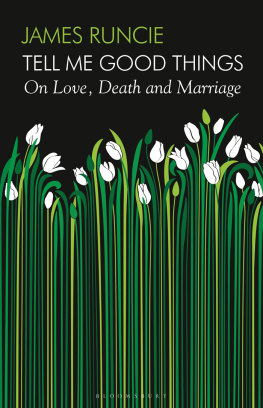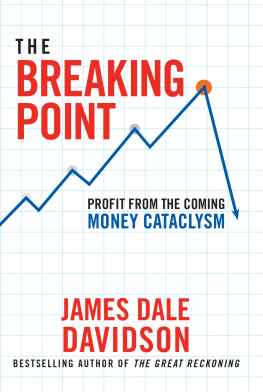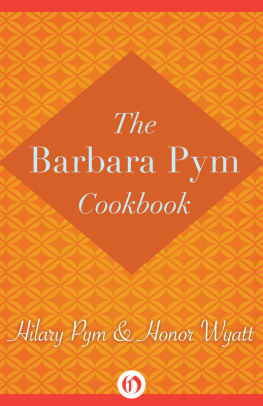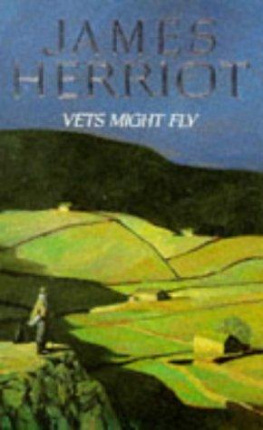The Sweet Dove Died
Barbara Pym
TO R.
Harper & Row, Publishers, New York
Cambridge, Philadelphia, San Francisco, Washington
London, Mexico City, Sao Paulo, Singapore, Sydney
THE SWEET DOVE DIED. Copyright 1978 by Barbara Pym. All rights reserved.
First perennial library edition published 1980. Reissued in 1987.
Library of Congress Cataloging-in-Publication Data
Pym, Barbara.
The sweet dove died.
I. Title.
[PR6066.Y58S9 1987] 823.914 86-45682
ISBN 0-06-097072-3 (pbk.)
87 88 89 90 91 MPC 10 987654321
I had a dove, and the sweet dove died;
And I have thought it died of grieving;
O, what could it grieve for? its feet were tied
With a single thread of my own hands weaving
John Keats
I
The sale room is no place for a woman, declared Humphrey Boyce, as he and his nephew James sat having lunch with the attractive stranger they had picked up at a Bond Street sale room half an hour ago.
Now youre scolding me, said Leonora, with mock humility. I know it was stupid of me, but I suppose it was the excitement of bidding for the first time in my life and then getting that dear little book. It was just too overwhelming!
And the room was so hot, James suggested, trying to take his part in the conversation, for after all it was he who had noticed the woman in black sway sideways and almost collapse at her moment of triumph, when she had challenged the auctioneers rather bored Twenty pounds at the table? with a cry of Twenty-five! Between them James and Humphrey had supported her out of the sale room and after that it seemed the natural thing for the three of them to be having lunch together.
Otherwise it had been a very boring sale, James thought. He had no interest in books and had spent the time idly watching the dealers, hunched over the table in their shabby clothes, making their bids with raised eyebrows or scarcely perceptible movements of hands or catalogues. The other bidders or spectators, mostly men, were crowded in rows on small chairs or standing in corners. A tall man with a slightly raffish air, leaning against the wall, had fixed his gaze on James and was staring at him every time James happened to glance in his direction. James lowered his eyes, feeling foolish but also a little flattered. He was not quite sure if he wanted that kind of admiration and found himself wondering if the diversion of Leonoras near-collapse had saved him from a fate worse than death.
My dear Miss Eyre, Humphrey was saying, the clerk of the sale would have taken a bid for you, or Id gladly have done it for you myself if Id known.
How very kind of you Ill remember that another time. Do you have books in your antique shop? Leonora asked.
No. We specialise in porcelain and bronzes and small objects you know the kind of thing.
Objets dart et de vertu, she murmured, with a delightful accent.
Exactly. Humphrey bent towards her admiringly to refill her glass with the hock he had chosen as being particularly appropriate to the occasion. That this exquisite creature should have been exposed to the contaminating presence of the dealers, for the sake of some trifling little Victorian flower book, hardly bore thinking of and filled him with horror. A book sale was certainly no place for a woman; had it been a sale of pictures or porcelain, fetching the sort of inflated prices that made headline news, or an evening sale perhaps being televised to which a woman could be escorted after being suitably wined and dined-that might have been another matter altogether.
And you . .. Leonora turned her gaze upon James. You assist your uncle in his business?
Im trying to learn it, said James.
Yes, I thought a book sale might be useful experience for him, said Humphrey. One sometimes comes across books at country house sales. What a fortunate accident it was, our coming here today!
James thought his uncle was making rather a fool of himself. Miss Eyre was certainly of a suitable age for Humphrey to marry, if that was what he wanted, though he had been a widower for so long now that it seemed unlikely he would wish to improve on the convenient arrangements he already had and take such a drastic step as marriage. On this first meeting James admired Leonora very much, particularly the unusual and old-fashioned elegance of her wide-brimmed hat which cast fascinating shadows on a face that was probably beginning to need such flattery. He was attracted to her in the way that a young man may sometimes be to a woman old enough to be his mother.
You must come and see the shop, he suggested. Its quite near Sloane Square.
Indeed, yes, if you happen to find yourself near Sloane Square, Humphrey joined in, and really cne quite often does, dont you think?
Certainly, Leonora said, smiling. One does try to arrange ones days so that one visits as many agreeable places as possible and avoids those one dislikes.
James was surprised to hear her say this and wondered how she managed to arrange her days in this way, when most other people one knew had to work or led dull, housebound lives. Perhaps she had money or was kept in an old-fashioned way like an Edwardian mistress in St Johns Wood. Indeed this might well be so, he thought, as he heard her give Humphrey her address.
Quite a sweet little house, she said. I hope you and your nephew will come and dine with me one evening, so that I can repay your kindness and this delicious lunch.
They saw her into a taxi straight home to gloat over my enchanting little book and then made as if to return to the antique shop.
Well, well, said Humphrey in an avuncular manner, not quite knowing what comment to make to his nephew about a woman to whom they both seemed to be attracted. That sale turned out to be more interesting than we expected.
Yes. James laughed in a rather embarrassed way. I wonder if well ever see her again.
Oh, surely. Humphrey sounded quite confident that they would. And now, he said, hesitating on the edge of the pavement. I think I wont come back to the shop with you this afternoon. You and Miss Caton can manage perfectly well on your own. It will be good experience for you.
James said nothing. Everything he didnt particularly want to do was described by Humphrey as good experience, but as it was quite likely there would be no customers he supposed he would be able to cope.
Humphrey turned and went away in the opposite direction, smiling to himself. He felt a certain responsibility for James, the only son of his brother who had been killed in the war, and who had quite recently also lost his mother. There was something about the idea of an orphan that brought out the best in Humphrey, that desire to do good without too much personal inconvenience that lurks in most of us. When James came down from Oxford after an undistinguished career and with no particular ambitions, it had not been at all difficult for Humphrey to take him into his antique shop and offer to teach him what he knew. Humphreys knowledge was not all that great, but it was more than his nephews complete ignorance. Moreover, Jamess good looks and pleasing manners were a definite advantage in attracting customers to the shop and persuading difficult American women to buy, and the arrangement was working out very satisfactorily. Humphrey had his flat in Kensington while James lived more modestly in Notting Hill Gate. Their social lives did not impinge on each other to any extent, for an uncle nearing sixty had little in common with a nephew of twenty-four and Humphrey was relieved that he did not have to spend too much of his time with James. Now, for instance, he intended to return to his flat for a short nap, after which he would make his way to his club for dinner and bridge. James, he imagined, would leave the shop at five-thirty, making quite sure that it was locked though he suspected that Miss Caton, the admirable, fussy middle-aged typist, did not really trust James and would herself be the last to leave and then either go back to Notting Hill Gate or sample the life of Chelsea, about which Humphrey was vague, for it was some time since he had set foot in the
Next page
